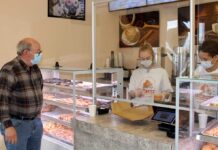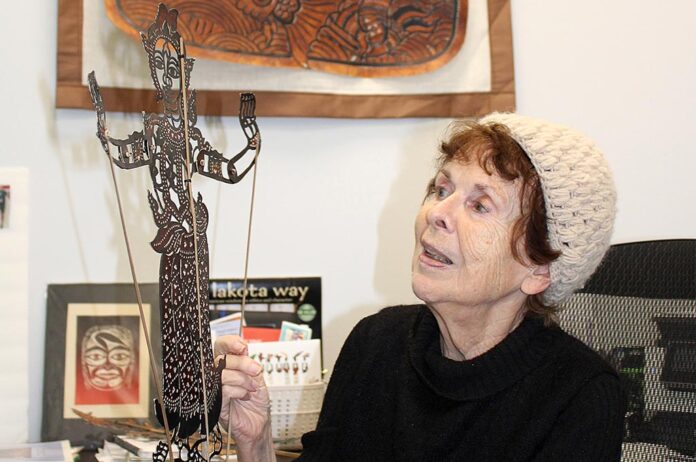
“All the world’s a stage,” a line from William Shakespeare’s “As You Like It,” could not be a more fitting introduction to Helena de Crespo. She has spent her life directing and performing in theater, film, stage and radio around the world (in English and Spanish in 16 countries on three continents so far).
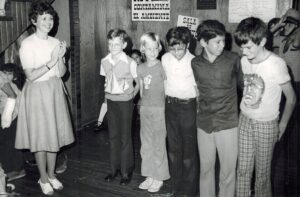
Her encounters with dozens of rich cultures led her to start Save World Art in 2012, which was formed to support communities of artists throughout the world.
In 2011 while leaving the temples of Angkor Watt in Cambodia, de Crespo encountered an indigenous opera company performing by the side of the road. Through her interpreter, the company’s director told her they were starving and begged her to help.
Back in the States, de Crespo started fundraising and sent money to the group. Save World Art was formed in 2012 and incorporated in 2016 as a 501(c)(3) non-profit.
In addition to the opera company in Cambodia, the organization has supported a theater company in Colombia, knitting and crocheting artisans in Iran, silk weavers and inlay-marble-tile artisans in India, dancers in Nepal, and Native Americans working to keep their culture alive in Oregon.
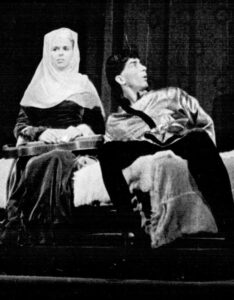
De Crespo would rather focus on Save World Art than herself, but her own story is as intriguing as any story ever written. In Spain, where de Crespo was born, Francisco Franco Bahamonde led the overthrow of the government and ruled as a dictator from 1939 to 1975. “My dad was condemned to death by Franco because he opened a school outside the jurisdiction of the church but escaped over the Pyrenees, and my mom rescued him from a concentration camp,” de Crespo said. “They took me to my grandmother’s in England, where I grew up. I got a full scholarship to the Royal Academy of Dramatic Art, and after I graduated, I got my first job as an actress in Scotland. There was never anything else I wanted to do.”
She spent years acting on stage and television in Great Britain before being invited to perform in New York City and thereafter traveled back and forth across the Pond to perform. In the U.S., she did two national theater tours with Joan Fontaine, and in Los Angeles, de Crespo worked for Lucille Ball at Desilu.
De Crespo returned to England and performed with prestigious theater companies for four years before deciding to be a script-writer. A theater company in England asked her to come to Cartegena, Colombia, in South America, to do a documentary.
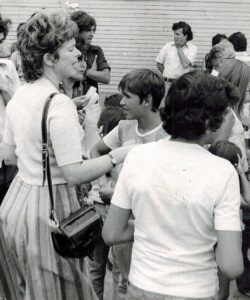
From there she traveled to Bogota, Colombia, and almost immediately got a contract with the government that led to her operating her own theater company while also serving on the faculty of three universities and receiving an award for her cultural contributions.
De Crespo’s work in Colombia led to an invitation to work in Costa Rica, where she created a cultural center in the poorest barrio in San Jose, the capital. “I needed a place where I could teach classes and was taken to a recently vacated brothel,” de Crespo said. “The madam showed me around initially, and it was perfect. It had lots of small rooms. The barrio had a bad reputation, and a United Nations study concluded that theater and football would restore it.
“I had come from Colombia and had an international following. The local people wanted to do the Passion Play (which depicts the trial, suffering and death on the cross of Jesus Christ). I got a grant from the United Nations to produce and direct it, and it was probably the best thing I have ever done. The play was performed across the entire barrio and had 300-plus actors. The hard part was getting the apostles.”
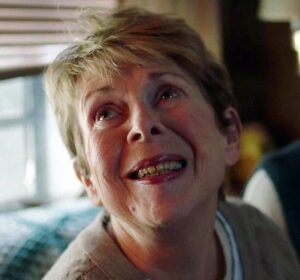
What was supposed to be one performance was so successful that it was performed again, and it changed the whole image of the barrio for the better. Afterwards, de Crespo took another show on the road around the country.
De Crespo returned to the U.S. and first lived in Washington, D.C., followed by New York and Arizona before moving to Oregon 12 years ago to perform in a show. She has performed on stage in many venues in the Portland area, including a memorable run as “Shirley Valentine,” and spent a year in Ashland. Her film work includes a role in Francis Ford Coppola’s “Peggy Sue Got Married.”
After performing in Singapore and Nepal, de Crespo went on that fateful trip to Cambodia that propelled her to start Save World Art.
“Theater has given me a wonderful life,” de Crespo said. “But don’t call me an actress. I am a performer.”
De Crespo is grateful that Office Depot in Tigard has provided her with an office and a home base for her organization; more information can be found at saveworldart.org.
She invites people to contact her at 503-516-4316 or email her at helena@helenadecrespo.com or visit her at 15060 S.W. Sequoia Parkway, #8, Tigard 97224.










